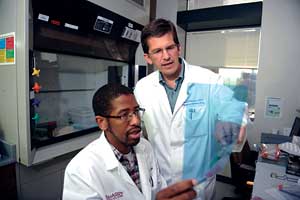Shape the Future
Donors Key to Progress at Vanderbilt-Ingram Cancer Center
March 21, 2012
The transformative generosity of 205,000 donors who have given to the university-wide Shape the Future campaign has touched every part of Vanderbilt and provided resources to advance its mission of education, discovery and patient care. Vanderbilt-Ingram Cancer Center received more than $216 million, including a lead gift in 1999 from the Ingram Charitable Fund. With this support, we can treat more people and provide better care, leading to more positive outcomes. Here are a few examples of how philanthropy is moving Vanderbilt-Ingram toward its goal of being the pre-eminent cancer center in the Southeast and a recognized leader, nationally and globally, in the effort to prevent and treat cancers.
Endowed Chairs
Donors provided $37 million to endow 23 faculty chairs, strengthening and deepening the center’s research.

William Pao, M.D., Ph.D., came to Vanderbilt in 2009 as an Ingram Associate Professor of Cancer Research. As director of Vanderbilt’s Personalized Cancer Medicine Initiative, he is breaking new ground in matching the right drug to the right patient at the right time. He also directs the Division of Hematology and Oncology and is a co-founder of My Cancer Genome, an online tool to enable a genetically informed approach to cancer medicine.

Stephen Fesik, Ph.D., the inaugural recipient of the Orrin H. Ingram II Chair in Cancer Research, was recruited in 2009 to lead cancer drug discovery at Vanderbilt. With 235 publications, 10 patents and numerous awards for his scientific achievements – including the National Institutes of Health Director’s Pioneer Award, a first for Vanderbilt – Fesik is developing new approaches for discovering drugs to target proteins currently considered “undruggable.”
Facilities
More than $39 million was received for facilities and technology, aimed toward providing expanded patient care and resources for families.

The recent expansion of the Henry-Joyce Cancer Clinic is a key example of the impact of that generosity. Vanderbilt-Ingram now serves more patients and the wait time for treatment has been reduced. Pain and symptom management services are available, and patients and families benefit from the resource center. The expansion also advances Vanderbilt’s discovery efforts and an ongoing commitment to conduct high-impact research and clinical trials, improving the process for developing promising new therapies.
Research
Donors provided more than $124 million to support cancer research at Vanderbilt-Ingram, providing crucial momentum for advancing discoveries in the war on cancer.
 The Robert J. Kleberg, Jr. and Helen C. Kleberg Foundation made a long-term investment in basic and translational cancer science, enabling Vanderbilt to emerge as an international leader in the early detection of cancer and personalized cancer medicine. Jim Ayers made a gift in 2005 to establish the Jim Ayers Institute for Pre-Cancer Detection and Diagnosis, which applies new proteomics technologies to identify protein biomarkers for cancer, making Vanderbilt a global leader. A gift from the T.J. Martell Foundation established the Frances Williams Preston Laboratories in 1993. These “laboratories without walls” focus on high-risk, high-payoff research, benefiting every scientist at VICC.
The Robert J. Kleberg, Jr. and Helen C. Kleberg Foundation made a long-term investment in basic and translational cancer science, enabling Vanderbilt to emerge as an international leader in the early detection of cancer and personalized cancer medicine. Jim Ayers made a gift in 2005 to establish the Jim Ayers Institute for Pre-Cancer Detection and Diagnosis, which applies new proteomics technologies to identify protein biomarkers for cancer, making Vanderbilt a global leader. A gift from the T.J. Martell Foundation established the Frances Williams Preston Laboratories in 1993. These “laboratories without walls” focus on high-risk, high-payoff research, benefiting every scientist at VICC.
